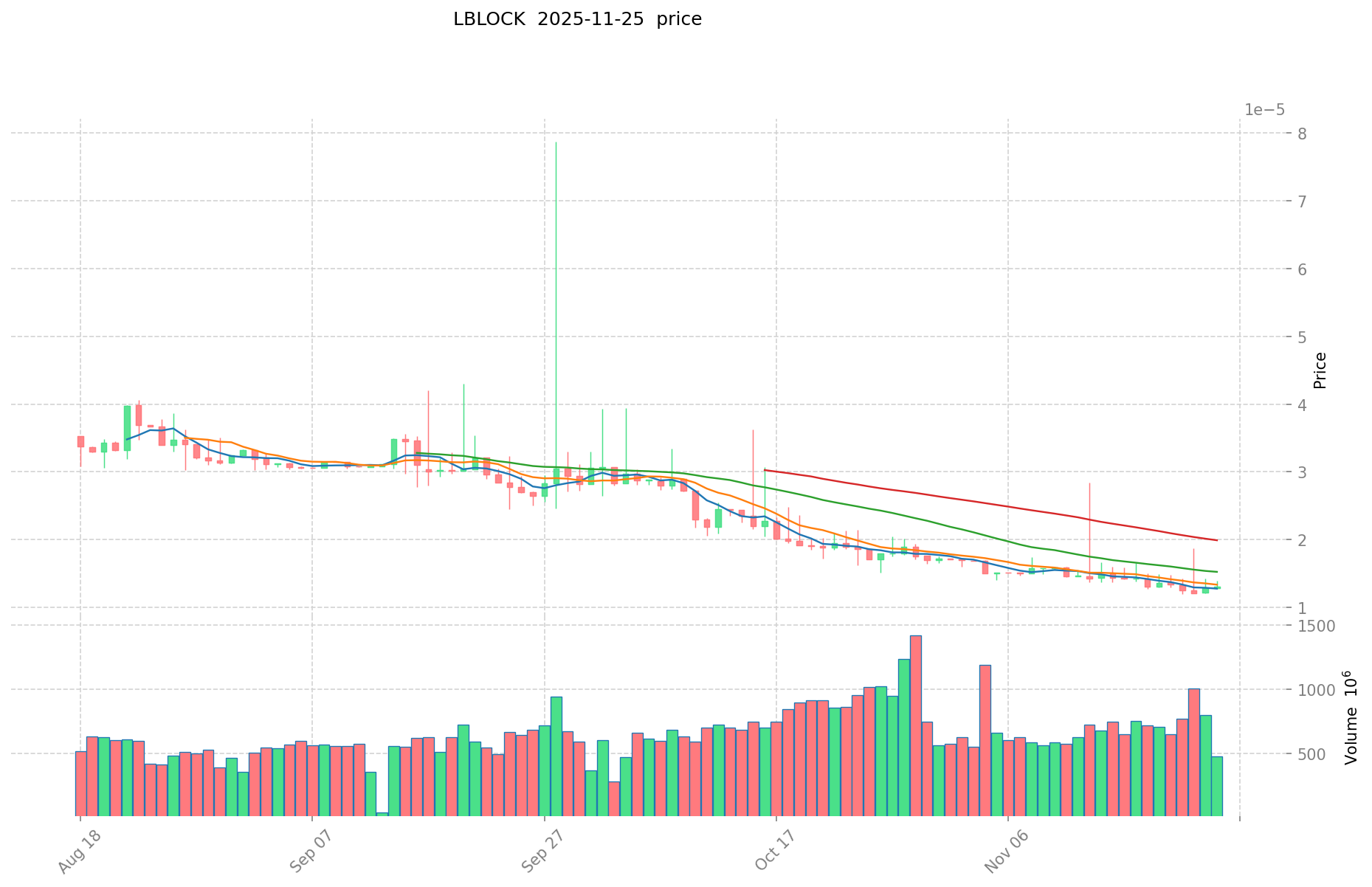What is LBLOCK: Exploring the Innovative Blockchain-Based Gaming Platform
Lucky Block's Positioning and Significance
In 2022, Lucky Block (LBLOCK) was launched as a leading NFT competitions platform, aiming to revolutionize the lottery and gaming industry by leveraging blockchain technology. As the first-of-its-kind platform in the crypto space, Lucky Block plays a crucial role in the intersection of NFTs, gaming, and rewards.
As of 2025, Lucky Block has established itself as a unique player in the blockchain gaming sector, with an active community of NFT holders and competition participants. This article will analyze its technical architecture, market performance, and future potential.
Origins and Development History
Birth Background
Lucky Block was created in 2022 to address the limitations of traditional lottery systems and provide a more transparent, fair, and rewarding experience for participants. It emerged during the NFT boom and blockchain gaming revolution, aiming to combine the excitement of competitions with the benefits of blockchain technology.
Lucky Block's launch brought new possibilities for both NFT enthusiasts and those seeking innovative ways to participate in reward-based competitions.
Key Milestones
- 2022: Platform launch, introducing NFT-based competitions and rewards.
- 2025: Continued platform development and expansion of the NFT competition ecosystem.
With support from its community and development team, Lucky Block continues to enhance its platform, security, and real-world applications in the blockchain gaming space.
How Does Lucky Block Work?
Decentralized Control
Lucky Block operates on a decentralized network, removing the need for traditional centralized lottery operators or intermediaries. This approach increases transparency and gives users more control over their participation in competitions.
Blockchain Core
Lucky Block's blockchain serves as a public, immutable digital ledger that records all transactions and competition results. This ensures transparency and fairness in the competition process. Anyone can view the records, establishing trust without intermediaries.
Ensuring Fairness
Lucky Block uses smart contracts to automate and ensure fair competition processes. Participants can enter competitions by holding specific NFTs, with results determined through transparent mechanisms recorded on the blockchain.
Secure Transactions
Lucky Block employs public-private key cryptography to secure transactions:
- Private keys are used to sign transactions and prove ownership of NFTs
- Public keys serve as identifiers for user accounts
This mechanism ensures the security of assets and maintains pseudonymous transactions. The use of blockchain technology adds an extra layer of security and transparency to the competition platform.
LBLOCK's Market Performance
Circulation Overview
As of November 25, 2025, LBLOCK's circulating supply is 100,000,000,000 tokens, which is equal to its total supply of 100,000,000,000.
Price Fluctuations
LBLOCK reached its all-time high of $0.00974554 on February 18, 2022.
Its lowest price was $0.000000067315, occurring on August 11, 2025.
These fluctuations reflect market sentiment, adoption trends, and external factors.
Click to view the current market price of LBLOCK

On-Chain Metrics
- Daily Transaction Volume: $5,319.94 (indicating network activity)
- Active Addresses: 3,694 (reflecting user engagement)
LBLOCK Ecosystem Applications and Partnerships
Core Use Cases
LBLOCK's ecosystem supports various applications:
- NFT Competitions: Lucky Block platform, offering rewards for holding NFTs and participating in contests.
Strategic Partnerships
LBLOCK has not disclosed any specific strategic partnerships at this time.
Controversies and Challenges
LBLOCK faces the following challenges:
- Market Volatility: Significant price fluctuations, with all-time high of $0.00974554 and all-time low of $0.000000067315.
- Competition: Pressure from other blockchain-based lottery and NFT competition platforms.
These issues have sparked discussions within the community and market, driving continuous innovation for LBLOCK.
LBLOCK Community and Social Media Atmosphere
Fan Enthusiasm
LBLOCK's community shows some activity, with 3,694 holders as of the latest data.
On X platform, related posts and hashtags (such as #LBLOCK) occasionally gain traction.
Social Media Sentiment
Sentiment on X is mixed:
- Supporters praise LBLOCK's NFT competition platform and potential for rewards.
- Critics may focus on price volatility and market performance.
Recent trends show a decline in price over the past year, with a 12.57% decrease.
Hot Topics
X users discuss LBLOCK's NFT competitions, price movements, and platform development.
More Information Sources for LBLOCK
- Official Website: Visit Lucky Block official website for features, use cases, and latest updates.
- X Updates: On X platform, Lucky Block uses @luckyblockcoin, as of November 25, 2025. Posts cover NFT competitions, platform updates, and community events.
LBLOCK Future Roadmap
- Ecosystem Goal: Expand the NFT competition platform and increase user participation.
How to Participate in LBLOCK?
- Purchase Channels: Buy LBLOCK on Gate.com
- Storage Solutions: Use secure wallets compatible with ERC-20 tokens
- Participate in Competitions: Enter NFT competitions on the Lucky Block platform
- Community Engagement: Follow official social media channels for updates and community activities
Summary
LBLOCK redefines digital assets through blockchain technology, offering NFT-based competitions and rewards. Its unique platform and community engagement set it apart in the cryptocurrency space. Despite facing market volatility and competition, LBLOCK's innovative approach to NFT competitions gives it a distinctive position in the decentralized technology future. Whether you're a newcomer or an experienced player, LBLOCK is worth watching and participating in.
FAQ
What does block the Company do?
Block is a financial services company focused on economic empowerment. It operates globally with over 10,000 employees and raised $2.2 billion in its last funding round in September 2025.
What does "block" mean in slang?
In slang, "block" often refers to a person's head. It's commonly used in phrases like "knock someone's block off," meaning to hit someone's head or face.
What is block pay?
Block pay is a fixed work schedule for a set period, typically full-time, with agreed-upon hours and compensation. It ensures consistent work commitments and pay for employees.
What is a block in computer?
A block is a fixed-size unit of data storage on a hard drive or other storage devices. It helps organize and manage data efficiently in computer systems.
Share
Content